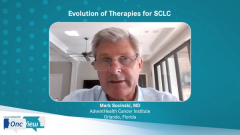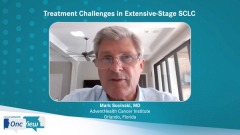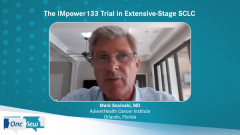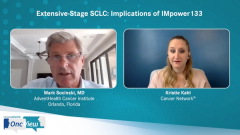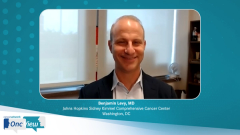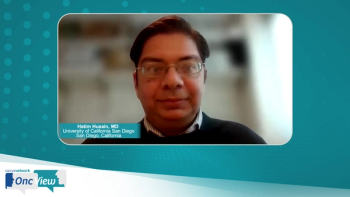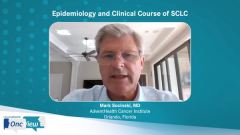
First-Line I-O Plus Chemotherapy for Extensive-Stage SCLC
A review of safety and efficacy data demonstrated by the IMpower133 clinical trial of atezolizumab plus chemotherapy as first-line treatment for extensive-stage small cell lung cancer.
Episodes in this series

Kristie Kahl: I want to focus on IMpower133. What was the design of the study, and what kind of patients were included?
Benjamin Levy, MD: These were patients with extensive-stage small cell lung cancer, and the study was a very simple design. These were patients with measurable disease and preserved performance status and who were treatment-naїve. Patients with treated brain metastases were eligible. This trial, IMpower133, took about 400 patients and randomized them 1:1, very simple, to carboplatin or etoposide. Carboplatin was given at an AUC [area under the curve] of 5 day 1. Etoposide was 100 mg/m2 day 1, 2, and 3 and given every 21 days vs carboplatin-etoposide with the addition of atezolizumab every 21 days for 4 cycles. Atezolizumab was allowed as maintenance every 3 weeks. Patients could be treated until progression or toxicity, and in the other arm was a placebo. Remember, I talked to you about prophylactic cranial irradiation. This could be done according to the standard of care, so that was allowed. That was the main design. As for the primary end point, there were 2. One was overall survival, the other was investigative-assessed PFS [progression-free survival], and then the secondary end points of response rate, duration of response, and safety.
Kristie Kahl: What were the findings on the key efficacy end points?
Benjamin Levy, MD: I’ll get to the bottom line. There was really no difference in response rates. Immunotherapy did not elicit more response than chemotherapy alone. The response rate of 3 drugs was no higher than 2 drugs, and that’s because chemotherapy alone did such a good job of eliciting responses in small cell. There’s very little difference in PFS. The biggest news that came out of the study was that there was an overall survival advantage. For the patients in the chemotherapy–I/O [immuno-oncology] arm, carboplatin-etoposide-atezolizumab had a median survival time of 12.3 months. In the placebo group it was 10.3 months. The hazard ratio was 0.7. That was statistically significant, so there was roughly a 2-month benefit in overall survival.
Some people look at that and say, “With just 2 months of immunotherapy, when will we see bigger gains in non–small cell lung cancer?” But you have to remember that this is a disease where we are hungry and we have not seen survival advantages in a long time. I would make the case that clearly, median survival times that are improved by 2 months are meaningful. If we looked at the landmark survivals at 12 and 18 months, there was improvement as well. I mean, 34% of patients at 18 months were still alive on the chemotherapy–I/O arm, which is pretty meaningful compared with just 21% in the chemotherapy arm. This solidified atezolizumab as a standard of care.
We always have to look at safety with immunotherapy in combination with chemotherapy. There were no new safety signals. I know this is a big question: “OK, you added the I/O to the chemotherapy and saw the survival advantage of 2 months, but did this cause more toxicity?” The bottom line is that there weren’t any more adverse events—specifically, immune-related adverse events—with the triplet therapy than we generally see with I/O therapy alone. The drugs were well tolerated overall, and safety was not compromised by adding immunotherapy to chemotherapy. Because of that, the FDA approved it in 2019. NCCN [National Comprehensive Cancer Network] made it a category 1 preferred option, so it’s an option. This is 1 option that should be leveraged for patients with extensive-stage small cell lung cancer
Transcript edited for clarity.
Newsletter
Stay up to date on recent advances in the multidisciplinary approach to cancer.


